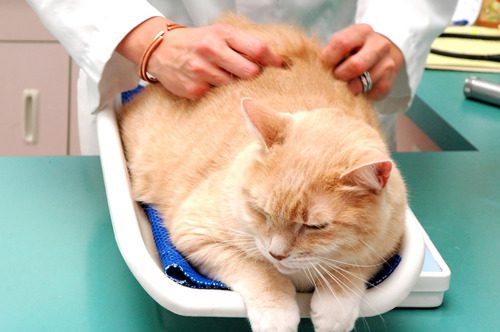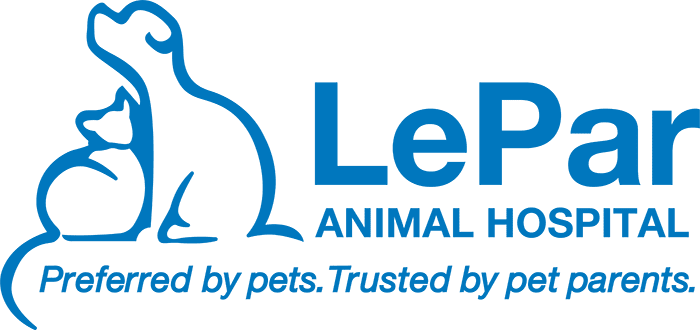Pet Obesity: How You Can Keep Your Pet Healthy
Although it’s tempting to share table scraps with your four legged friend, your pet may gain weight that is harmful to their health. Pet obesity is a growing concern among veterinarians and pet owners alike. At LePar Animal Hospital in Evergreen Park, we are committed to helping you keep your pet healthy and happy. If you suspect your pet is overweight, call (708) 423-3200 or book an appointment online for a thorough evaluation.

Is My Pet Overweight?
Pet obesity is defined as an excessive accumulation of body fat. This condition can affect both cats and dogs, leading to various health issues and a decreased quality of life. Common signs of pet obesity include visible weight gain, difficulty moving, and labored breathing.
What Are Common Causes of Pet Obesity?
Several factors contribute to pet obesity, and understanding these can help you make better choices for your pet’s health.
- Overfeeding: Many pet owners unintentionally provide too much food or offer calorie-dense treats frequently.
- Lack of physical exercise: Pets need regular exercise to maintain a healthy weight, and a sedentary lifestyle can lead to weight gain.
- Genetics: Genetics can predispose certain breeds to obesity. For example, Labrador Retrievers and Dachshunds are more likely to gain weight easily.
- Age & Health Issues: Age and hormonal imbalances, such as hypothyroidism, can contribute to obesity.
Potential Risks Associated with Pet Obesity
Overweight pets are at a higher risk of developing diabetes, arthritis, and heart disease. Excess weight puts additional stress on joints, leading to pain and mobility issues. Obesity can also shorten your pet’s lifespan and diminish their overall quality of life.
The Impact of a Balanced Diet on Your Pet’s Health
Feeding your pet the right amount of high-quality food can prevent weight gain and ensure they receive essential nutrients. Consult with your veterinarian to determine the appropriate portion sizes and type of food for your pet’s specific needs. Avoid feeding table scraps and high-calorie treats, which can contribute to obesity.
Creating an Exercise Routine for Your Dog or Cat
Dogs typically require at least 30 minutes of exercise daily, while cats benefit from interactive play sessions. Incorporate activities that your pet enjoys, such as walking, running, or playing fetch. Indoor activities like using toys and climbing structures can keep cats active.
Monitoring Your Pet’s Weight
Weigh your pet at home or during veterinary visits to track their progress. Your veterinarian can provide a target weight and develop a customized weight loss plan if necessary. Consistent monitoring ensures that any changes in your pet’s weight are addressed promptly.
Ways to Prevent Pet Obesity
Preventing pet obesity requires a combination of proper diet, exercise, and regular veterinary care. Implementing the following tips can help you maintain your pet’s healthy weight:
- Balanced Nutrition: Ensure your pet’s diet is balanced and appropriate for their age, size, and activity level. High-quality commercial pet foods are formulated to provide the necessary nutrients without excess calories. Consult your veterinarian for recommendations on the best diet for your pet.
- Portion Control: Measure your pet’s food accurately and follow the feeding guidelines provided by your veterinarian. Avoid free-feeding, which can lead to overeating and weight gain.
- Regular Exercise: Incorporate regular exercise into your pet’s daily routine. For dogs, daily walks and playtime are the best way to exercise your pet. Cats benefit from interactive toys and activities that encourage movement. Tailor the exercise routine to your pet’s preferences and physical abilities.
- Limit Treats: While treats can be a valuable training tool, they should be given in moderation. Opt for low-calorie treats or use small portions of your pet’s regular food as rewards. Avoid feeding human food, which can be high in calories and unhealthy for pets.
How LePar Animal Hospital Can Help
Regular veterinary visits to LePar Animal Hospital can help manage your pet’s weight and overall health. These appointments enable your veterinarian to assess your pet’s body condition score (BCS) and provide guidance on weight management. They can also rule out any underlying medical conditions that may contribute to weight gain.
Weight Management Plans
If your pet is overweight, your veterinarian can develop a weight management plan tailored to their needs. This plan may include dietary changes, increased physical activity, and regular monitoring. Follow your veterinarian’s recommendations closely to ensure your pet’s weight loss journey is safe and effective.
The Role of Pet Owners
As a pet owner, you play a crucial role in maintaining your pet’s healthy weight. Stay informed about pet nutrition and exercise requirements, and be proactive in implementing healthy habits. Monitor your pet’s weight regularly and seek veterinary advice if you notice any changes.
Promoting a Healthy Lifestyle for Your Pet
Encouraging a healthy lifestyle for your pet involves a holistic approach. Ensure they receive a balanced diet, regular exercise, and consistent veterinary care. By addressing all aspects of their well-being, you can help prevent obesity and other related health issues.
Educating Yourself and Others
Educating yourself about pet obesity and its risks is the first step in promoting a healthy lifestyle for your pet. Share your knowledge with other pet owners to raise awareness about the importance of weight management. By working together, we can combat pet obesity and improve the lives of our furry companions. If you’re worried about your pet’s weight, contact LePar Animal Hospital at (708) 423-3200 or book an appointment online today.
Recent Posts
About Us
LePar Animal Hospital has served generations of pets and families in Evergreen Park, Oak Lawn, Palos, and neighboring suburbs, and we hope to serve generations more! Our animal hospital is accredited by the American Animal Hospital Association (AAHA) and staffed with Fear Free Certified veterinarians providing a multitude of services, from wellness and dental care to acupuncture, chemotherapy, and surgery.
